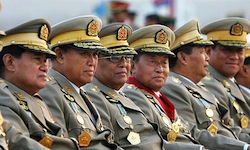Report Says Burma is Pursuing Nuclear Weapons
June 4, 2010
Featured Image
Today's top nuclear policy stories, with excerpts in bullet form.
Stories we're following today, Friday, June 4, 2010:
Report Says Burma is Taking Steps Toward Nuclear Weapons - Joby Warrick in The Washington Post [link]
- Burma has begun secretly acquiring key components for a nuclear weapons program, including specialized equipment used to make uranium metal for nuclear bombs, according to a report that cites documents and photos from a Burmese army officer who recently fled the country.
- The analysis, commissioned by the dissident group Democratic Voice of Burma, concludes with "high confidence" that Burma is seeking nuclear technology, and adds: "This technology is only for nuclear weapons and not for civilian use or nuclear power."
- Among the images provided by the major are technical drawings of a device known as a bomb-reduction vessel, which is chiefly used in the making of uranium metal for fuel rods and nuclear-weapons components.
- The report notes that the Burmese scientists appear to be struggling to master the technology and that some processes, such as laser enrichment, likely far exceed the capabilities of the impoverished, isolated country.
- For more information, see Geoffrey Forden's technical analysis post below from Arms Control Wonk.
Now It Can Be Told: Inside BOB - Geoffrey Forden in Arms Control Wonk [link]
- Last January, I was invited to join a group of experts in Oslo, Norway, to review a ton of electronic documents smuggled out of Burma to the Democratic Voice of Burma (DVB).
- The arrangement of equipment that I alluded to above makes sense for a general purpose machine shop, one that might get a wide variety of orders but always for one or two items. It might even be intended solely from prototyping, albeit some pretty massive prototypes, some weighing up to 20 tons!
- It seems unlikely that the shop is intended for producing centrifuges, which require thousands for any meaningful project. It is, of course, conceivable that they might make missile parts since those are often done in onesies and twosies.
- Burma also appears to be following another acquisition path: purchasing missile production lines and know-how from the North Koreans. Here most of the evidence comes from a single source; a summary of a trip report describing the activities and accomplishments of a number of high-ranking Burmese officials made to North Korea.
To Make the Spill Worse, Go Nuclear - David Hoffman for Foreign Policy [link]
- Could we turn swords into ploughshares just once and drop an ICBM warhead down that tube gushing oil at the bottom of the Gulf of Mexico? Wouldn’t that just stanch the leak and save the environment?
- No. Quite the opposite, this would make things even messier.
- Ask the people who live near the Semipalatinsk test range in Kazakhstan, a 19,000 square-kilometer zone where the Soviet Union carried out 456 nuclear blasts from 1949 until 1989. Contamination poisoned the population.
- Aside from the environmental hazards, there would be a global outcry against the use of a nuke in peacetime, which would not only violate arms control treaties but make it immensely more difficult to persuade countries like Iran and North Korea not to build a bomb.
Commentary: China Needs to Be Cut Off from Enabling North Korea - Joel Brinkley for McClatchy [link]
- The world is trying to determine how to punish North Korea for sinking a South Korean warship last month, killing 46 sailors. But all will be for naught as long as China continues serving as North Korea's enabler.
- Under China's protective umbrella, North Korea has deployed nuclear weapons, test-fired ballistic missiles, sold advanced weaponry to other renegade states, counterfeited millions if not billions in foreign currency, laundered cash for drug traffickers - and now carried out a major, unprovoked military attack. None of that seems to bother Beijing.
- China's motives are clear enough. Its leaders know if they back away from North Korea, reduce or eliminate aid, the regime will quickly collapse. Almost everyone in the world would welcome that - except China. The Chinese worry about millions of refugees pouring over the border, about a new government in Pyongyang dominated by South Korea and its ally, the United States.
- Make China aware of the immediate benefits. If North Korea were a friendly, peaceful nation, the U.S. could reduce its military presence in the region - something China ardently wants.
A View from the Dark Side
Stop START - The American Spectator [link]
- It should give us some concern when President Obama goes out of his way to tout a new strategic arms reduction treaty (START) signed with the ever compliant Medvedev.
- U.S. Senators should stop START. As a treaty, it requires a vote of two-thirds of the U.S. Senate. Republicans and defense-minded Democrats -- are there any left? -- must hold up ratification until many, many questions are answered.
- This treaty will disarm the U.S. without making similar demands on Russia. Russia will retain its current substantial advantage over this country in the numbers of tactical nuclear weapons.
- Put very simply, the Russians have done nothing recently to merit our trust. Signing an arms reduction agreement with them now makes no sense. They may not want war, but they want the fruits of war.



